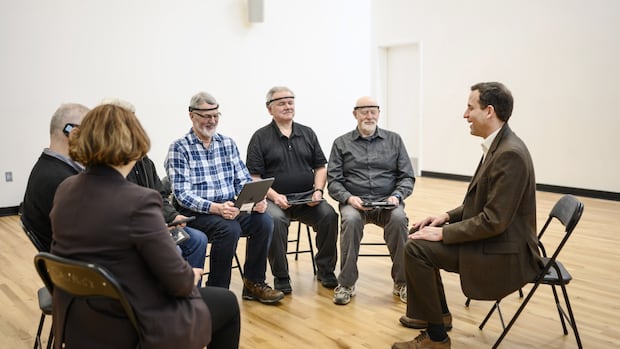
How dishes and a friend system reduced the cost of health care for patients with prostate cancer
A new study that found a daily dose of information, which helps men to deal with the physical and mental crisis of prostate cancer, is also saving the money of Nova Scotia’s health system.
“It is one of the rare interventions that improves results and reduces costs,” a co-author Gabrila Ili wrote, a research psychological and professor in the medical faculty of Dalhousie University, recently in an email about “patient empowerment program” or Pep.
ILIE and Radiation oncologist Dr. The program created by Rob Rutlage in 2019 includes pelvic exercises to improve bladder control, aerobic and strength exercise routine, and instructions regarding maintaining intimacy despite lost sexual ability.
Six-month-old video-emails teach methods of attention and provide “most plant-based” cooking lessons. Participants can sign up for a “big system” to offer mutual support as male radiation, surgery and hormone recover from therapy.
Cost-effectiveness studies were done between 2020 and 2022 and released on June 13 in the Canadian Urological Association Journal, concluding that 66 men who participated in a period of one year made about 11 trips to seek medical help for 62 men receiving “standard care”.
Ellie wrote in an email, “This is a lack of four low medical trips about man per man, when scaling into the medical system, a meaningful change.”
Health benefits, cost savings
Using medical billing data, researchers said that after taking into account the costs of the program, a “direct savings” of about $ 661 per patient was created per year. The total billing for the participants in the year is an average of $ 1,195, which is about $ 1,856 for non-participants.
Ellie said that the study also saw that “a reduction of 31 percent among the participants in 12 months … psychological crisis.”
Prior to this, the research conducted on PEP has improved urinary function and weight loss among men who have followed video regime created by Ili and Rutlage-who are married.

While surgery, radiation, and hormone treatment can lead to treatment in the treatment of prostate cancer, Rutlege and Ili argue that health system has failed to provide support after diagnosis, even research shows that men often struggle with mental health issues.
Surgery can often damage the nerve loops near the prostate, a walnut -shaped gland above the genitals. This injury can limit men’s ability – which research has indicated that there are often feelings of crime, loss and inadequateness. Treatments also often increase incontinence, social isolation and depression.
To combat this, the PEP video made by researchers is a careful orchestrated routine that includes text message reminder for pelvic practice.
‘A sense of optimism’
Joseph Linton, a retired psychiatrist participating in the study, said he joined the advice of his surgeon after the “life -changing” operation to remove the prostate gland and the surrounding tissues.
The 72-year-old said that he felt self-conscious-and sometimes due to his own incontinence.
Once at the PEP program, Litton said that this helped him to get “a sense of optimism” because he shared information from other participants in the zoom call and did “religious” to share information, referred to as Kegelles, which was referred to as Kegles.

He said, “Losing your prostate can affect a very sensitive and important part of your manhood … I would say that I had some extent I experienced depression and I think that being part of the program helped me through it,” he said.
Litton also said that he would need further treatment for his mental health without the program. “When I joined the program, I felt that I did not need any now (clinical treatment for anxiety),” he said.
Rutlage and Ili spend several empty hours of working on video and widen their application for pilot projects with other cancer patients.
Comprehensive application
While the initial concept for the program attracted philanthropic support through the Soil Research Fund created by Frank and Debbie Sobi, they say that their research is suggesting the “empowerment” method, more widely used in public health systems.
They are seeking support from the Cancer Care Division of Nova Scotia Health seeking support to help a large pilot project, said Rutle.
Jill Flyn, a senior director of the Cancer Care Program of Nova Scotia Health, said in an email that research findings have been reviewed and “it is clear that the program had a positive impact on prostate cancer and life and welfare of patients with their families.”
“Their requests for financing the cancer care program will be reviewed, as well as with other requests.”
Oncologist Dr. Christopher booths, an international study on the impact of exercise on the recurrence of stomach cancer, stated that a recent increased body of evidence in an email is “simple, cost-affected intervention that are empowered to patients” are improving welfare during treatment.
The recently released colon cancer study of his group found that patients who participated in a supervised exercise program after completing their chemotherapy were 28 percent lower the chances of their stomach cancer than patients in the control group.
The booth, who is also a researcher at Queen University in Kingston, Onts, said that health administration is “interested in these interventions, but current funding streams are still largely aligned as ‘traditional’ cancer therapy.”
“This will take new thinking and investment in this space,” he said.